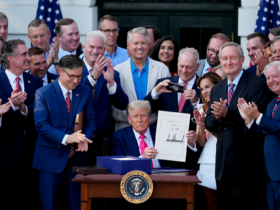Donald Trump recently made a mockery of his country’s most intellectual organizations – the national intelligence agencies. He accused the intelligence community of naïveté and inaction. Trump’s outburst was triggered by Iran that he hates so much. He didn’t like the things he had heard in a report by the Director of National Intelligence, Dan Coats, at the hearings of the US Senate Select Committee on Intelligence that focused on global and regional threats. “We continue to assess that Iran is not currently undertaking the key nuclear weapons-development activities we judge necessary to produce a nuclear device,” Coats said. He thus called into question the rationality of the decisions taken by the President. It was Trump who initiated the severing of the nuclear deal with Iran on the basis of claims the Iranians had been cheating and couldn’t be trusted as regards nuclear weapons.
“Iran’s continued implementation of the JCPOA [Joint Comprehensive Plan of Actions] has extended the amount of time Iran would need to produce enough fissile material for a nuclear weapon from a few months to about one year,” Coats said.
Trump apparently disliked this kind of rhetoric, twittering, “The Intelligence people seem to be extremely passive and naive when it comes to the dangers of Iran. They are wrong! When I became President Iran was making trouble all over the Middle East, and beyond. Since ending the terrible Iran Nuclear Deal, they are MUCH different […].” He added, though, that the Iranians remained a source of hypothetical threats and conflicts.
The President made emphasis on the alleged shortage of knowledge in the intelligence services. “They [Iranians] are testing Rockets (last week) and more, and are coming very close to the edge. There economy is now crashing, which is the only thing holding them back. Be careful of Iran. Perhaps Intelligence should go back to school!”
He thus addressed criticism to one of the strategically crucial systems that influence the shaping of America’s foreign policy in its entirety. This is indicative of a fundamental factor, namely, that Trump doesn’t have the qualified team members with an ability to sway his position on Iran anymore. Their absence is a big drawback for him if he is pondering reelection in 2020. He will definitely need a trump card up his sleeve during the election race. Putting stakes on a confrontation with Iran, like he did during the first election race, will be highly counterproductive, especially against the backdrop of his acerbic treatment of the intelligence services, which are known to play a vital role in the formation of the country’s foreign policy.
It’s noteworthy however that Donald Trump’s decision-making is fluctuant and he changes his mind briskly. He wrote in a tweet on Coats’s report somewhat later that all blame should go to the media, which provoked his highly critical rhetoric against the US intelligence services:
For truth’s sake, although Trump and Coats’s positions on Iran differ markedly, the big jigsaw still has the bits that reveal the unity of opinion between the man in the Oval Office and the head of national intelligence – the unity that brings out the essence of US policies towards the disfavored countries, namely, the yearning to undermine them and to meddle in their domestic policies by hook or by crook. Iran is one of the main targets in this strategy.
Some declarations Dan Coats made in his report might have prompted Trump to alter his stance and to modify the tonality of his criticism. Coats claimed, among other things, that protests would intensify in Iran shortly, although they would largely remain “uncoordinated and lacking central leadership or broad support from major ethnic and political groups”. He voiced the confidence that the Iranian hardliners would consolidate their positions and would challenge the centrists through undermining the efforts of the latter in the sphere of domestic reforms. Coats also indicated that the US intelligence community expected more aggressive security measures on the part of Tehran in response to the resumption of unrest.
This information – and past experience as well – shows the likelihood of the US secret services involvement in the forthcoming protests in Iran, since a person at the head of the US intelligence system can make statements of this kind only if he is entangled in the process personally. It also looks like this was the only argument that influenced the disconcerted Trump. Coats and he don’t have contradictions on the issue. They are very much in agreement on this case.

















Leave a Reply